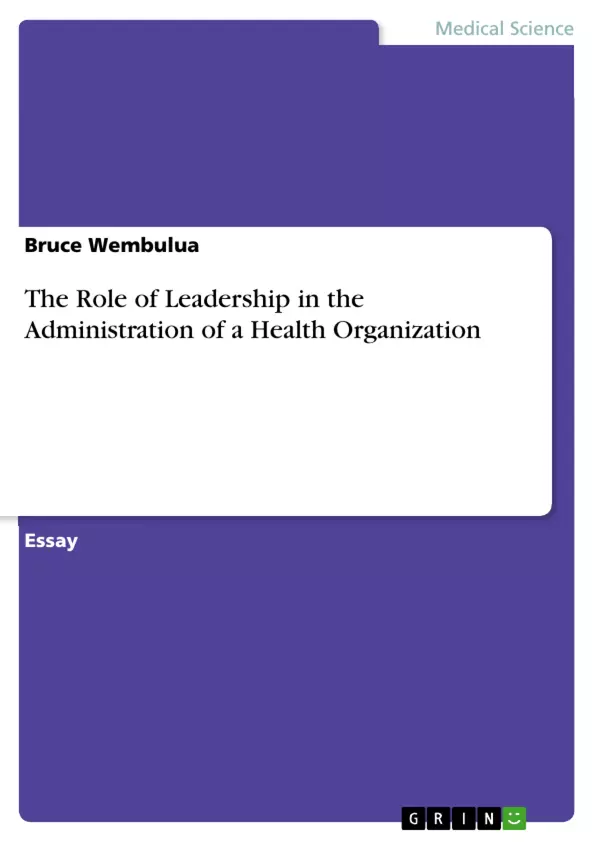“People are led and resources are managed”. A clear understanding of this critical and meaningful difference is the beginning of leadership wisdom that opens the way to being successful. Throughout human history, leadership has been of great importance. Nowadays as much as ever, better leadership helps organizations survive through today’s dynamic world where the business environment is consistently changing and driven by economic instability. Both global and domestic advances in technology, changing markets, regulatory change and fierce competition call for suitable influence from leaders to have objectives met. Organizations realize that effective leadership will provide them with a competitive superiority over rivals and the ability to carry out profound transformation to their organizations.
The health care industry is an enormous business, one of the most dynamic sectors driven by the economic situation. Every person in the world needs health care, governments are judged on it as almost everyone is interested in how it is delivered. It is known that better health promotes economic growth which in turn, by catalyzing the equitable distribution of wealth, leads to healthier populations. In such a sensitive sector, leadership and continuity of leadership are of great significance for the provision of effective services.
Organizing and managing healthcare delivery to meet higher standardized quality levels is a complex undertaking. Be it at the national level, local levels or at the level of individual interaction between healthcare professional and patient - profound knowledge of both management and leadership principles are required to navigate and successfully solve problems of cost, quality, and access to care across the continuum of care in our society. Leaders are indeed the catalysts for organizational, group, and individual greatness. No great leaders of our time have been successful and prosperous without first understanding the principles of leadership.
Using analytic and documentary methods, this piece of work aims to depict effective leadership as a cornerstone of every successful healthcare organization. Although complex in its composition, successful health organizations need effective leadership and management to enable them functioning as single unit for effective and better achievements.
Inhaltsverzeichnis (Table of Contents)
- INTRODUCTION
- CHAPTER 1 : LEADERSHIP IN A HEALTH ORGANIZATION
- Effective Leadership
- Leadership and Management
- CHAPTER 2 : NEED FOR EFFECTIVE LEADERSHIP IN HEALTH ORGANIZATIONS
- Health care organization and Leadership challenges
- Effective leadership: Cornerstone of successful healthcare organizations
Zielsetzung und Themenschwerpunkte (Objectives and Key Themes)
This piece of work aims to showcase the importance of effective leadership in the successful operation of healthcare organizations. It highlights the multifaceted nature of leadership, encompassing both its scientific and artistic aspects. Furthermore, it examines the challenges and opportunities that effective leadership presents within the complex healthcare landscape.
- The significance of effective leadership in the healthcare industry
- The interconnectedness of leadership and management in driving organizational success
- Challenges and opportunities posed by the complexity of the healthcare system
- The role of leadership in promoting teamwork, managing resources, and navigating change within healthcare organizations
- The importance of leadership in fostering a positive and supportive work environment for healthcare professionals
Zusammenfassung der Kapitel (Chapter Summaries)
The first chapter focuses on defining effective leadership in a healthcare context, highlighting its artistic and scientific dimensions. It discusses the different styles and perspectives on leadership, emphasizing the importance of influencing and coping with change within organizations. The chapter also explores the crucial role of leaders in setting organizational vision, promoting teamwork, and ensuring a supportive work environment.
The second chapter delves into the need for effective leadership in healthcare organizations, recognizing the unique challenges presented by this complex sector. It underscores the importance of leadership in addressing multidirectional goals, coordinating diverse departments, and navigating conflicts between different professional groups. The chapter concludes by emphasizing the positive impact of effective leadership on patient care and organizational outcomes.
Schlüsselwörter (Keywords)
Key terms and concepts explored in this work include effective leadership, leadership styles, healthcare organization, management principles, healthcare challenges, organizational change, teamwork, work environment, patient care, and organizational outcomes.
Frequently Asked Questions
Why is leadership critical in healthcare organizations?
Healthcare is a dynamic and complex sector driven by economic instability and technological advances. Effective leadership helps organizations survive, meet quality standards, and solve problems related to cost and access to care.
What is the difference between leadership and management?
The text states that "people are led and resources are managed." While management focuses on organizing and coordinating resources, leadership is about influence, vision, and guiding people through change.
What are the main challenges for leaders in the health sector?
Leaders face multidirectional goals, the need to coordinate diverse departments, navigating conflicts between professional groups, and maintaining high standards of quality in a changing regulatory environment.
How does effective leadership impact patient care?
Effective leadership fosters a supportive work environment and promotes teamwork, which directly leads to better achievements in service delivery and improved patient outcomes.
Is leadership in healthcare a science or an art?
It is both. It encompasses scientific principles of management and the "artistic" ability to influence people, set a vision, and adapt to the human complexities of the medical field.
- Citar trabajo
- Bruce Wembulua (Autor), 2016, The Role of Leadership in the Administration of a Health Organization, Múnich, GRIN Verlag, https://www.grin.com/document/344704



